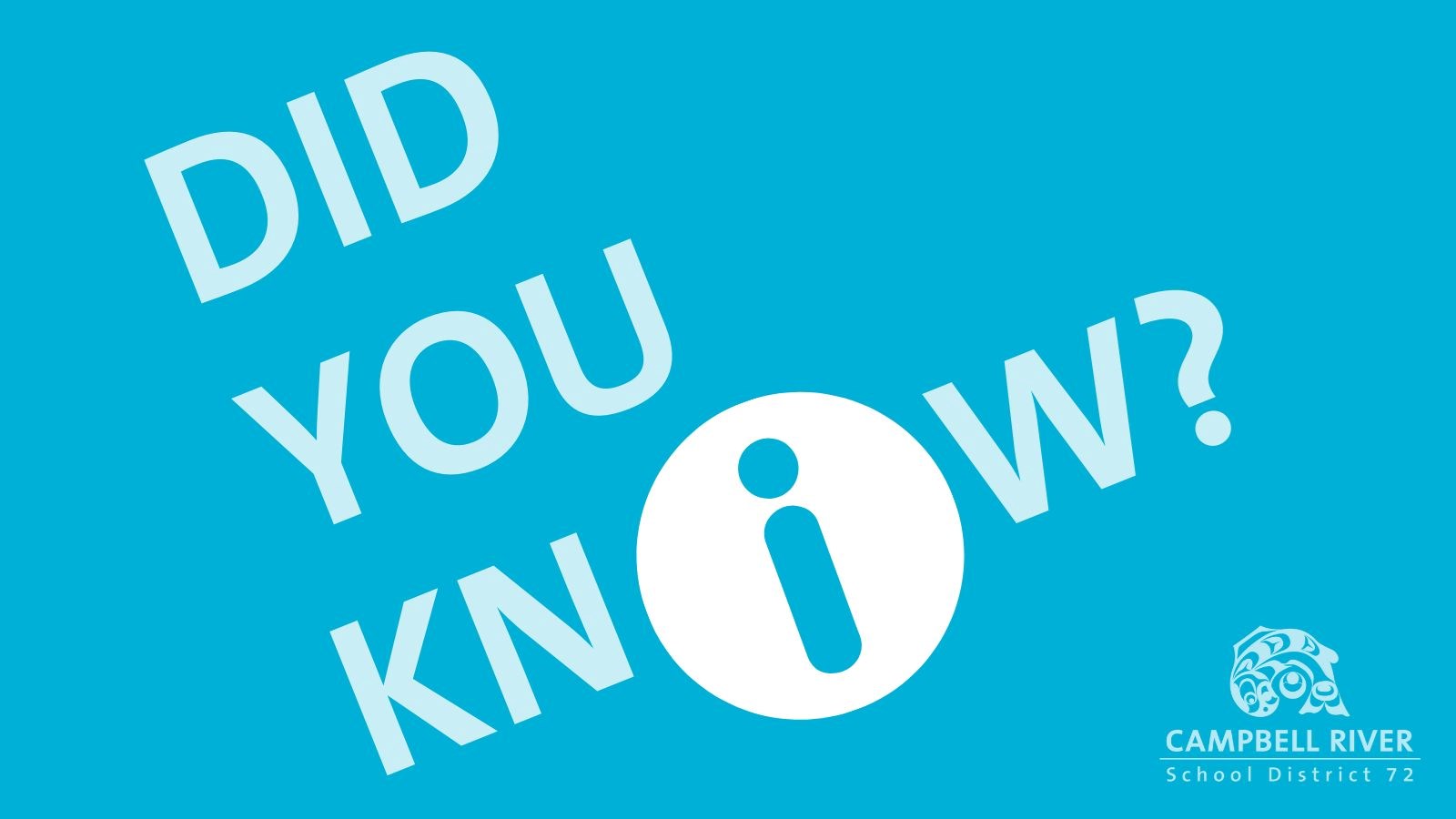For Your Information

Here is some information that we have been asked to share with families
Head Lice Awareness- Head lice are common in BC communities. Although they are a bother, head lice are not a health risk. Head lice spread quickly by close, head-to-head contact. Lice cannot live on furniture or carpet, and they cannot jump or fly. There may be few or no symptoms, but itching may occur. More details here: Head Lice Awareness.pdf
Electronic Cigarettes- What are e-cigarettes? E-cigarettes are popular “high tech” devices on sale at many convenience stores and stand-alone e-cigarette retailers. They are sometimes marketed as a safe alternative to smoking and the advertising is aimed at hooking youth. More details here: Electronic Cigarettes (E-Cigarettes).pdf
Healthy Relationships with food- Are you curious about how to help your child eat well, have a healthy weight and develop a healthy relationship with food? Healthy foods served in a relaxed family atmosphere are the best way to help children develop a healthy relationship with food. More details here: Healthy Relationship With Food.pdf
Move More, Sit Less- Bodies are made to move and children and youth need to be moving more. How much more? At least 60 minutes every day! What types of activity?
- Heart-pumping aerobic activity like running, basketball, soccer and biking at least 3 days each week
-Strengthening activities 3 days a week like climbing and swinging at the playground, push-ups, running, and jumping rope
Moving in all different ways helps children develop physical literacy AND a love of movement. More details here: Move More Sit Less!.pdf
The Many Active Ways For Your Child To Get To School- Walking or wheeling all the way to school or every day may not be possible for your family, but there are alternatives that you may not have considered. If you want to make the journey to school more active and get your kids into the lifelong habit of active travel, consider these options..The Many Active Ways For Your Child To Get To School.pdf
School District 72 Elementary Pizza Party CONTEST- The theme for this year’s Family Literacy Week in Campbell River is Make it Count! *Play*Sort*Measure*. The Campbell River Literacy Association is challenging elementary schools during the week of January 23 – 27 (either as a whole school or individual classroom) to create a pattern using whatever materials you’d like! The winners will get a pizza party for their entire school! Also, there will once again be a direct link for classrooms that would like to livestream the free community show sponsored by the Tidemark Theatre on Friday, January 27 at 1 p.m. This year’s show will feature Squamish and Haida stories by Kung Jadee. The teacher direct link will be forwarded to teachers once it’s received from the literacy association.
Family Literacy Week 2023 Schedule- Family Literacy Week is January 23-27 and there will be a lot of family events happening around town(Campbell River). Family Literacy Week 2023 Schedule.pdf
Talking to Children and Youth about Decriminalization and Substance Use: Resources for Parents/Guardians and Caregivers January 31, 2023
Background: As you may be aware, Health Canada has granted the Province of British Columbia an exemption from the federal Controlled Drugs and Substances Act, allowing the removal of criminal penalties for possession of small amounts of certain illicit substances for personal use.
Decriminalizing people who use drugs is a part of the Government’s work to tackle the toxic drug crisis, intended to remove the shame and stigma associated with substance use and support people in accessing important health and social services.
To be clear, this exemption does not apply to licensed child care or K-12 school properties. The federal Controlled Drugs and Substances Act continues to apply to these settings, meaning there will continue to be criminal penalties for possession of illegal substances, regardless of amount, while on child care and or K-12 school properties.
This exemption also does not apply to youth aged 17 and younger, who will continue to be subject to the federal Youth Criminal Justice Act (YCJA). This means that youth aged 17 and younger will not be permitted to possess illicit substances in any amount.
It is important to note that decriminalizing people who use illicit substances does not mean legalizing drugs. This is not the same as legalizing cannabis as the federal government did; decriminalized drugs will not be sold in stores and they are not legal to manufacture. Drug trafficking and similar drug-related offences involving illegal substances in any amount will remain illegal.
Removing the shame and stigma associated with substance use is one tool of many in British Columbia’s response to the toxic drug crisis as laid out in A Pathway to Hope, the Government’s roadmap for building a supports and services for mental health and addictions care.
This plan also guides the creation and expansion of substance use services for British Columbians – including doubling the number of youth treatment beds – ranging from prevention and early intervention to intensive treatment and crisis intervention. Prevention efforts include the opening of 14 Foundry centres across the province, which provide wraparound mental health and substance use support to young people.
Talking to Young People: While decriminalization will not apply to youth aged 17 and younger, this important change could provide an opportunity to talk openly with your child or youth about substance use and addictions.
The Ministry of Education and Child Care’s Expect Respect and A Safe Education (erase) substance use website also provides students, parents/guardians, caring adults and educators with information and resources to support conversations with youth about substance use. The website has been updated to include information regarding the exemption to decriminalize people who use drugs and what decriminalization means—and what it does not mean—for youth in BC.
For further information regarding drug decriminalization in B.C., please visit: • Government of British Columbia – Decriminalizing personal possession of illicit substances • Government of Canada – Exemption from the Controlled Drugs and Substances Act



